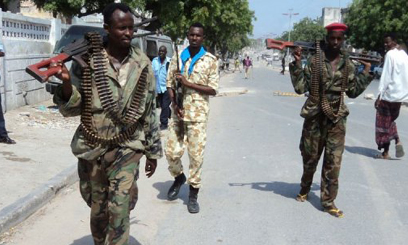NAIROBI, October 15 – Police have blamed a spate of kidnappings in eastern Kenya on Somali Islamist al Shabaab rebels, but abductions could also be the work of pirates, bandits or opportunistic criminal gangs, experts say.
However, amidst the debate, analysts agree that Kenya is vulnerable, warning it could be paying the price for intervention in neighbouring Somalia, where the hostages are now believed to be held.
Since September, gunmen have seized British tourist Judith Tebbutt and Frenchwoman Marie Dedieu from Kenya’s Lamu archipelago, which is popular with tourists, and two Spanish aid workers from Dadaab, the world’s largest refugee camp.
Tebbutt and Dedieu are in war-torn Somalia, while the two Spanish women are feared to have also been taken across the border after their abduction on Thursday.
After each attack, Kenyan police — who have been criticized for poor security and a slow response to the abductions — have rushed to point the finger of blame at the Al-Qaeda-linked al Shabaab.
But Roland Marchal, from the French National Centre for Scientific Research (CNRS), said the kidnappers could just be local criminals.
He also speculated Nairobi could be paying for backing southern Somali anti-al Shabaab militia, and criticized Kenya’s domestic policies towards its own ethnic Somali community, infiltrated over the years by al Shabaab loyalists.
“Instead of working with the Muslim community to try to undermine the ideological work of the al Shabaab, they isolated them and labelled them as potential terrorists,” he said.
The hard-line al Shabaab have vowed to destroy Somalia’s weak Western-backed transitional government, threatening last week to increase attacks after their worst suicide bombing yet in the Somali capital that killed at least 82 people.
But they have already struck outside their home ground, launching multiple bomb attacks in July 2010 in the Ugandan capital Kampala, killing 76 people watching the World Cup final.
Al Shabaab fighters have increasingly been recruiting outside Somalia’s borders, notably in Kenya.
But Marchal said Kenya was not alone in deserving blame. He criticised the “militaristic” strategies of the West, characterised by bombing raids by US drones.
Rashid Abdi, from the International Crisis Group, said he thinks al Shabaab elements want to punish Kenya for its “increasing military involvement” to create a buffer zone in southern Somalia, al Shabaab stronghold.
But he refused to rule out that the kidnappings might be motivated simply by “criminal” elements within the group, who now fear the once-powerful al Shabaab is on the back foot, with little prospect of a “political future” in Somalia.
African Union-backed government troops have driven al Shabaab fighters out of positions in the Somali capital since August, cutting the insurgents off from what had once been a key source of income.
But whoever is behind the kidnappings, Abdi says it is obvious Kenya has become a target for a large-scale attack.
“It is only a question of time,” he said, arguing that Kenya is “saddled with many systemic structural problems that are compounded by corruption”.
Abdi believes the kidnappings of the Frenchwoman and the British woman “are linked”.
“There is definitely a problem on the Kenyan coast, a problem emanating from Somalia,” he said.
Somalia has had no effective government ever since it plunged into repeated rounds of civil wars beginning in 1991, allowing a flourishing of militia armies, extremist rebels and piracy.
A Western security source said he was convinced “it was obviously pirates” who kidnapped Tebbutt and Dedieu.
But he added that does not necessarily imply a change of tactic on the part of the pirates, noting that seasonal monsoon winds and rougher seas prevent the raiders’ small boats for travelling far from shore to target boats.
“It could just be a question of opportunity when the sea is rougher, and it’s harder to attack ships,” the source added.
Michael G. Frodl, the founder of C-Level Maritime Risks, a Washington-based consultancy specialising in piracy issues, also advises against seeking one well-defined strategy behind the kidnappings.
“Most are still crimes of opportunity,” he said. “Western hostages are becoming a profitable commodity — and very liquid to trade in — which means we should only expect more kidnapping of Westerners, on land or on sea.”










































